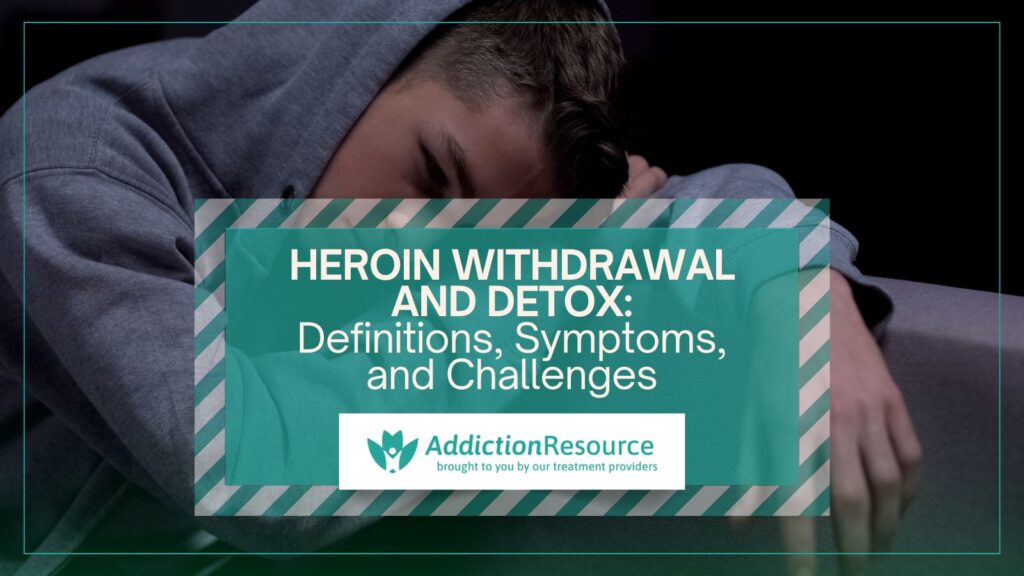
Heroin withdrawal happens when a person stops using the drug after prolonged use which results in symptoms like nausea, anxiety, muscle pain, and cravings. Heroin detox is the medical process of removing heroin from the body, the first step toward recovery. Heroin, a highly addictive opioid, profoundly affects the brain and body, leading to severe dependency.
Heroin withdrawal and detox addresses the physical dependence on heroin, setting the foundation for long-term treatment and preventing life-threatening complications. Heroin withdrawal and detox help individuals regain control over their health, emotions, relationships, decision making and start their journey toward sobriety.
What is Heroin Withdrawal?
Heroin withdrawal refers to the distressing symptoms that arise when someone with a dependency on heroin stops or significantly reduces its use. Withdrawal begins within a few hours after the last dose due to heroin’s short half-life. Heroin withdrawal symptoms include restlessness, muscle and bone pain, insomnia, diarrhea, vomiting, cold flashes (“cold turkey”), and involuntary leg movements. Major symptoms of heroin withdrawal are within 24 – 48 hours and subside after about a week. Some individuals may experience prolonged withdrawal effects for months, according to the research titled “What are the long-term effects of heroin use?” published by the National Institute of Drug Abuse. Heroin’s impact on the brain through injection or smoking heightens its addictive potential. Chronic use leads to heroin use disorder, a relapsing disease with compulsive drug-seeking behavior.
What are the Symptoms of Heroin Withdrawal?
The symptoms of heroin withdrawal are anxiety, depression, nausea, vomiting, diarrhea, abdominal cramps, bone and muscle pain, goosebumps, insomnia, runny nose, tearing eyes, yawning, dysphoria, anhedonia restlessness, cravings, sweating, tremors, elevated heart rate and blood pressure.
Below are the details of these symptoms:
- Anxiety: Anxiety is an overwhelming sense of worry or panic, caused by the brain’s adjustment to lower dopamine levels. Anxiety is a psychological symptom and leads to restlessness and hypervigilance.
- Depression: Depression is a persistent feeling of sadness, hopelessness, and emotional numbness due to disrupted dopamine production. Depression is a psychological symptom and contributes to suicidal thoughts if left untreated.
- Nausea and Vomiting: Nausea and vomiting are physical detox symptoms, accompanied by severe dehydration as the body attempts to expel toxins.
- Diarrhea: Diarrhea or increased bowel movements due to heroin’s removal disrupts the gastrointestinal system. Diarrhea is a physical symptom that leads to dehydration and weakness.
- Abdominal Cramps: Abdominal cramps and discomfort in the stomach region caused by digestive system distress are physical symptoms of heroin withdrawal.
- Bone and Muscle Pain: Bone and muscle pain are intense aches and soreness, as heroin’s suppression of pain signals is no longer active. Aches are a physical symptom that makes movement challenging.
- Insomnia: Insomnia refers to difficulty falling or staying asleep due to anxiety, discomfort, and brain hyperactivity due to the absence of heroin in the body.
- Runny Nose and Tearing Eyes: Runny nose and tearing eyes are flu-like symptoms caused by the body’s effort to clear itself of heroin.
- Yawning: Excessive yawning is a sign of fatigue and nervous system dysregulation. Excessive yawning is a behavioral symptom linked to withdrawal.
- Goosebumps: Goosebumps are a physical symptom involving sudden chills or cold flashes, referred to as “cold turkey,” caused by nervous system overactivity.
- Dysphoria: Dysphoria is a psychological symptom involving a profound sense of unease or dissatisfaction, often coupled with irritability due to the absence of heroin-released dopamine in the body.
- Anhedonia: Anhedonia is a psychological symptom involving the inability to feel pleasure because of heroin’s impact on the brain’s reward system.
- Restlessness: Restlessness is a constant need to move or shift positions due to discomfort or anxiety. Restlessness is a behavioral symptom tied to agitation during heroin withdrawal.
- Cravings: Cravings are an intense desire to use heroin again to relieve withdrawal symptoms. Cravings are both psychological and behavioral symptoms.
- Sweating: Excessive sweating is a physical symptom that appears as the body tries to regulate its temperature after stopping heroin use.
- Tremors: Tremors are physical symptoms involving uncontrollable shaking or trembling caused by hyperactivity of the nervous system.
- Elevated Heart Rate and Blood Pressure: Elevated heart rate and blood pressure are a response to the absence of heroin’s depressant effects. These are physical symptoms that increase the risk of cardiac stress.
- Fatigue: Fatigue is extreme tiredness resulting from insomnia, cravings, and the energy-intensive detox process.
- Irritability: Irritability refers to frequent frustration and short temper due to discomfort. Irritability is both a psychological and behavioral symptom.
What is the Heroin Withdrawal Timeline?
The heroin withdrawal timeline includes 6-12 hours, 1-3 days, and 7+ days. Below are the details of the heroin withdrawal timeline.
- 6-12 Hours (Early Withdrawal Symptoms): Early withdrawal symptoms begin within 6-12 hours after the last dose of heroin. Early signs include restlessness, anxiety, runny nose, tearing eyes, sweating, and yawning. Heroin’s early withdrawal symptoms occur as the body starts craving heroin, and the absence of the drug disrupts its normal functioning. Factors like frequent high doses or prolonged use intensify symptoms at this stage.
- 1-3 Days (Peak Withdrawal Symptoms): Peak withdrawal symptoms of heroin intensify and peak between 24–72 hours. The main symptoms include severe muscle and bone pain, abdominal cramps, diarrhea, vomiting, insomnia, cold flashes with goosebumps, and elevated heart rate and blood pressure. Heroin withdrawals at this stage are the most physically demanding, with symptoms varying based on heroin dosage, frequency of use, and overall health.
- 7+ Days (Late Withdrawal Symptoms): Late withdrawal starts subsiding after a week, but some may persist, including fatigue, depression, cravings, anhedonia (inability to feel pleasure), and dysphoria. Late withdrawal symptoms, such as mood swings and insomnia persist for months in individuals with prolonged or heavy heroin use.
What is the Heroin Detox Process?
Heroin detoxification is the process of eliminating heroin and its toxins from the body, making the first step toward recovery from addiction. Heroin detoxification’s main goals are to manage withdrawal symptoms, reduce physical dependence, and prepare individuals for long-term treatment. Detoxes are conducted in inpatient facilities, which provide 24/7 medical supervision and support, or outpatient settings, where individuals attend scheduled appointments while living at home. Medical supervision during detox is essential to ensure safety, as withdrawal symptoms are severe and life-threatening in some cases. Medications like methadone or buprenorphine are used to ease symptoms and reduce cravings, making the process more manageable and increasing the chances of successful recovery, according to the research titled “Medication-assisted treatment for opioid addiction: Methadone and buprenorphine” published by Journal of Food and Drug Analysis Volume 21.
What are the Common Medications Used During Heroin Detox?
The common medications used during heroin detox are methadone, buprenorphine, clonidine, and lofexidine. Below are the details of these medications:
- Methadone: Methadone is a long-acting opioid agonist that binds to opioid receptors in the brain, giving the effects of heroin but in a controlled and less intense manner. Methadone helps reduce withdrawal symptoms and reduce cravings, providing a more stable environment for individuals undergoing detox. Methadone allows for a gradual tapering process that minimizes the discomfort associated with withdrawal. Methadone maintenance therapy significantly improves retention in treatment programs and reduces illicit opioid use, making it essential for heroin detoxification, according to the research titled “Methadone maintenance therapy versus no opioid replacement therapy for opioid dependence” written by Richard P Mattick.
- Buprenorphine: Buprenorphine, is a partial opioid agonist which activates opioid receptors but produces less euphoria and sedation compared to heroin or methadone. Buprenorphine is a safer option for managing withdrawal symptoms and cravings. Pharmacological properties of buprenorphine lower the risk of misuse and overdose, enhancing its effectiveness in detox programs according to the research titled “Buprenorphine Treatment for Opioid Use Disorder: An Overview” published by the National Library of Medicine.
- Clonidine: Clonidine is a non-opioid medication that acts as an alpha-2 adrenergic agonist, targeting symptoms caused by the overactivation of the autonomic nervous system during withdrawal. Clonidine reduces anxiety, sweating, nausea, and high blood pressure but does not address cravings or euphoria.
- Lofexidine: Lofexidine is similar to clonidine, and is a non-opioid alpha-2 adrenergic agonist specifically developed for opioid withdrawal management. Lofexidine reduces symptoms such as chills, muscle cramps, and restlessness while having fewer side effects than clonidine. Lefoxidibe is approved by the FDA. Lofexidine improves patient comfort and reduces the severity of withdrawal symptoms during detox according to the research titled “A Comprehensive Update of Lofexidine for the Management of Opioid Withdrawal Symptoms” published by the National Library of Medicine. This makes it an essential option for individuals seeking relief from the physical discomfort of heroin withdrawal.
Why Professional Help and Detox Programs are Important?
Professional help and detox programs are important because they provide a structured, safe, and supportive environment for individuals undergoing heroin withdrawal. Heroin detox processes are physically and emotionally tiring, with severe symptoms that pose serious health risks without medical supervision. Inpatient detox programs offer 24/7 care, access to medications that ease withdrawal symptoms, and immediate intervention in case of complications. Support groups and counseling provided during detox programs address the psychological challenges of addiction. Medical care and emotional support combined with professional detox programs significantly improve the chances of long-term recovery.
What are the Challenges of Heroin Detox and Withdrawal?
The challenges of heroin detox and withdrawal are risks of relapse, managing cravings, and potential mental health effects. Below are the details of these effects:
- Risk of Relapse: Heroin detoxing comes with a high risk of relapse due to intense cravings and the body’s dependency on the drug. Individuals return to heroin use without proper support and coping mechanisms, increasing the danger of overdose.
- Managing Cravings: Managing cravings is difficult during heroin detoxification as heroin detox is driven by both physical dependence and psychological triggers. These constant urges make it difficult for individuals to focus on recovery. Medications like methadone or buprenorphine are used to reduce cravings and improve success rates during detox.
- Potential Mental Health Effects: Heroin withdrawal leads to severe mental health challenges, including anxiety, depression, and mood swings. These psychological effects are caused by the stress of detox and the brain’s adjustment to functioning without the drug. Professional intervention, including therapy and medications, is essential to address these mental health issues and support long-term recovery.
What is Heroin?
Heroin is a highly addictive opioid drug derived from morphine, a natural substance extracted from the seed pods of certain poppy plants. Heroin was originally developed in the late 19th century as a pain reliever and cough suppressant and was once marketed for medical use but is now illegal in most countries due to its high potential for abuse and addiction. Heroin is found as a white or brown powder or a black, sticky substance known as “black tar heroin.” Heroin’s ability to produce intense euphoria and sedation makes it a commonly misused drug, often with devastating health and social consequences.
What does Heroin look like?
Heroin looks like a white or brown powder, and in its more potent form, it is found as a sticky, black substance known as “black tar heroin.” The appearance varies depending on the purity, source, and method of production, with the powder form being more common in illicit markets. These forms are often ingested through injection, snorting, or smoking, each presenting its health risks.
What are the effects of Heroin?
Effects of heroin include intense euphoria, drowsiness, and a sense of well-being, which are caused by the drug’s rapid interaction with the brain’s opioid receptors. Heroin effects come with significant risks, including respiratory depression, which leads to fatal overdose, and long-term damage to physical and mental health. Heroin also induces withdrawal symptoms when use is stopped, which include muscle pain, nausea, and anxiety, making recovery particularly challenging. Heroin’s prolonged use leads to chronic health issues and a higher risk of developing heroin use disorder.
Does Methadone help with preventing heroin withdrawal symptoms?
Yes, methadone helps with preventing heroin withdrawal symptoms. Methadone is a long-acting opioid agonist that binds to the same receptors in the brain as heroin, easing withdrawal symptoms without producing the intense euphoria that heroin does. Methadone reduces cravings and withdrawal discomfort, making it an essential part of many detoxification and maintenance programs. Methadone is administered in a controlled setting to reduce the risk of misuse and overdose.
What is the difference between Heroin and Morphine?
The difference between heroin and morphine is that heroin and morphine are both derived from the opium poppy, but they differ in their potency and how they affect the body. Heroin is chemically altered from morphine and crosses the blood-brain barrier more quickly, leading to faster and more intense effects. Morphine is still used medically for pain relief, but heroin is illegal and abused due to its stronger euphoric effects and higher potential for addiction. Heroin’s rapid onset and potency make it more addictive than morphine, which is typically prescribed in medical settings under strict supervision.
Is Heroin withdrawal similar to withdrawal from other drugs?
Yes, heroin withdrawal is similar to withdrawal from other drugs. Heroin withdrawal includes discomforting symptoms such as anxiety, nausea, muscle pain, and insomnia. Heroin withdrawal tends to be more intense due to the drug’s powerful effects on the brain and the rapid onset of physical dependence on other opioids. Heroin withdrawal presents significant challenges compared to other substances. Medical teams use similar approaches, such as medication-assisted detox and supportive care, to manage withdrawal symptoms for different drugs.
Does heroin withdrawal produce more intense physical symptoms than cocaine withdrawal?
Yes, heroin withdrawal produces more intense physical symptoms than cocaine withdrawal. Heroin and cocaine both cause psychological distress and cravings, but heroin withdrawal involves more severe physical symptoms like muscle pain, sweating, vomiting, diarrhea, and chills. Heroin is a physically addictive opioid, which causes the body to develop a strong dependence on it. Cocaine is a stimulant that primarily affects mood and energy levels, with withdrawal symptoms being less physically intense, often involving fatigue, depression, and cravings.
Is insomnia a common withdrawal symptom for heroin?
Yes, insomnia is a common withdrawal symptom for heroin addiction. Heroin alters the brain’s natural chemistry, including its regulation of sleep. During heroin withdrawal, the body struggles to adjust to the drug, resulting in severe sleep disturbances and difficulty falling or staying asleep.
Page Sources
- Keck School of Medicine of USC. (2023, November 26). Opioid withdrawal increases health risks for people who inject drugs. Newsroom. https://keck.usc.edu/news/opioid-withdrawal-increases-health-risks-for-people-who-inject-drugs/
- Shah, M., & Huecker, M. R. (2023, July 21). Opioid withdrawal. StatPearls - NCBI Bookshelf. https://www.ncbi.nlm.nih.gov/books/NBK526012/
- World Health Organization. (2009). Withdrawal management. Clinical Guidelines for Withdrawal Management and Treatment of Drug Dependence in Closed Settings - NCBI Bookshelf. https://www.ncbi.nlm.nih.gov/books/NBK310652/
- Bluthenthal, R. N., et al. (2020). Opioid withdrawal symptoms, frequency, and pain characteristics as correlates of health risk among people who inject drugs. Drug and Alcohol Dependence, 211, 107932. https://doi.org/10.1016/j.drugalcdep.2020.107932
- Pergolizzi, J. V., Raffa, R. B., & Rosenblatt, M. H. (2020). Opioid withdrawal symptoms, a consequence of chronic opioid use and opioid use disorder: Current understanding and approaches to management. Journal of Clinical Pharmacy and Therapeutics, 45(5), 892-903. https://doi.org/10.1111/jcpt.13114
- What are the treatments for heroin use disorder? | National Institute on Drug Abuse. (2021, April 13). National Institute on Drug Abuse. https://nida.nih.gov/publications/research-reports/heroin/what-are-treatments-heroin-use-disorder
- Alsheikh, M. Y. (2021). Post-Acute Withdrawal Syndrome: The Major Cause of Relapse among Psychoactive Substances Addicted Users. Archives of Pharmacy Practice, 12(4), 91–97. https://doi.org/10.51847/ioicfujpnm


 Reviewed by:
Reviewed by:  Written by:
Written by: 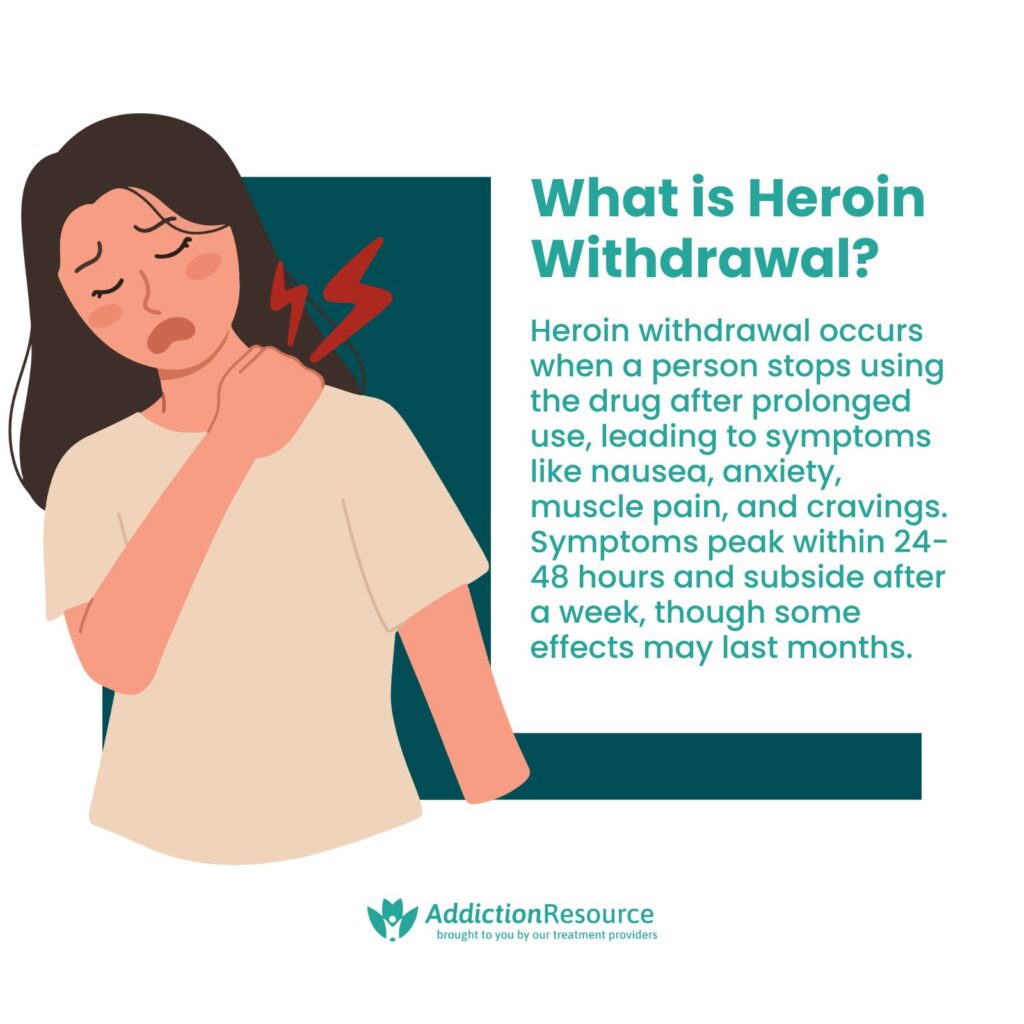
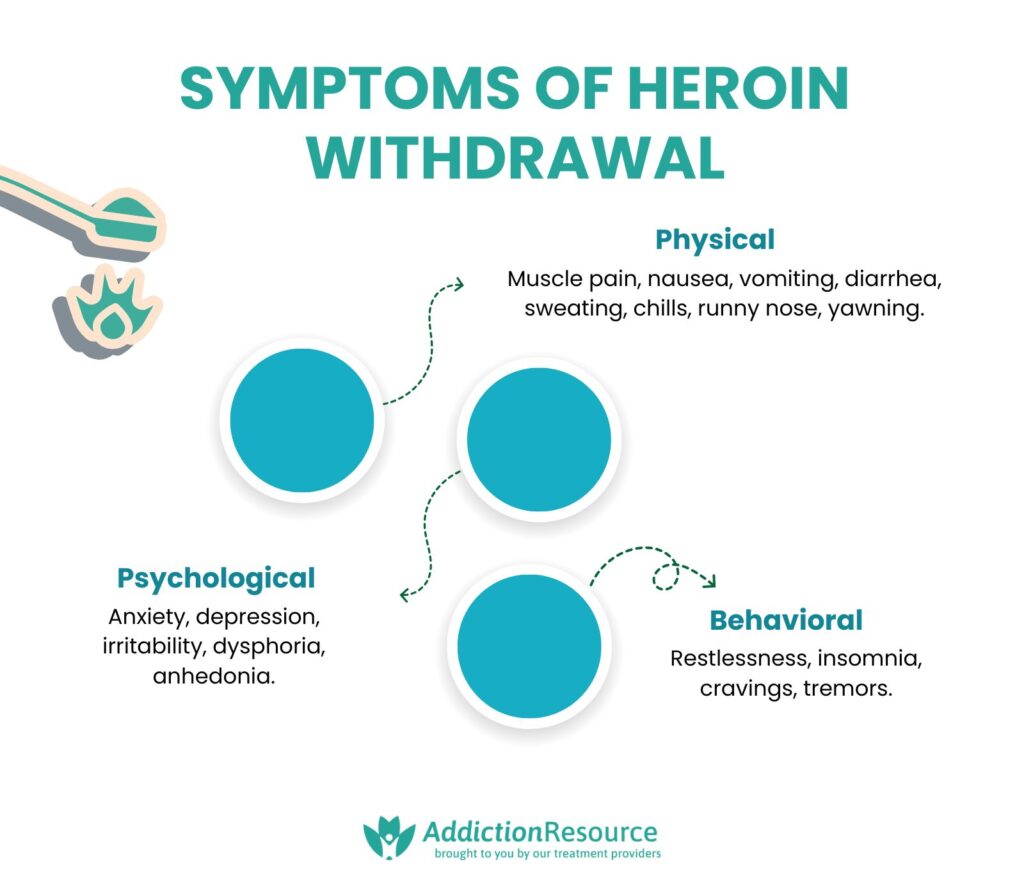
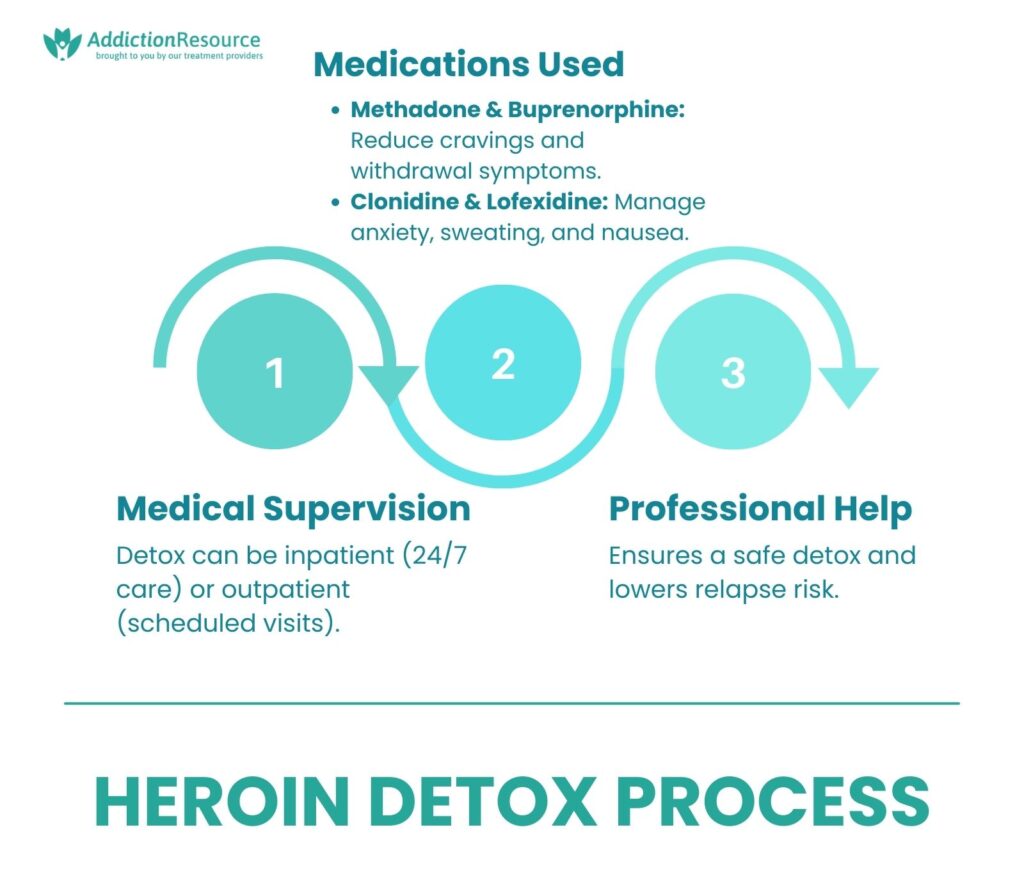
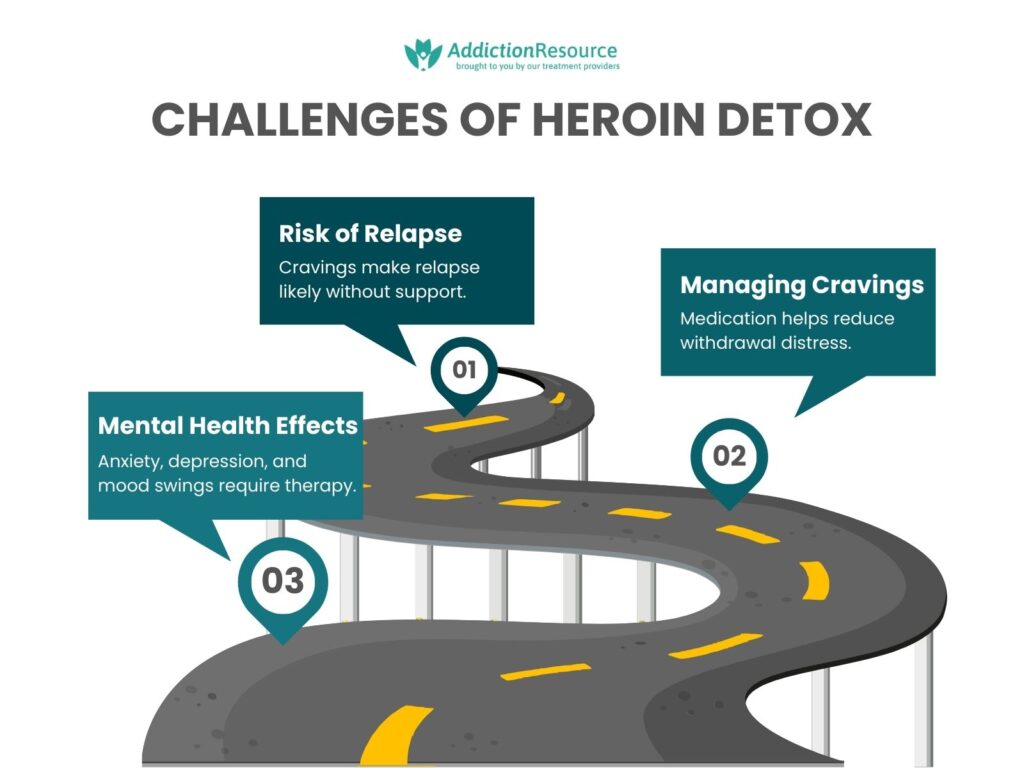
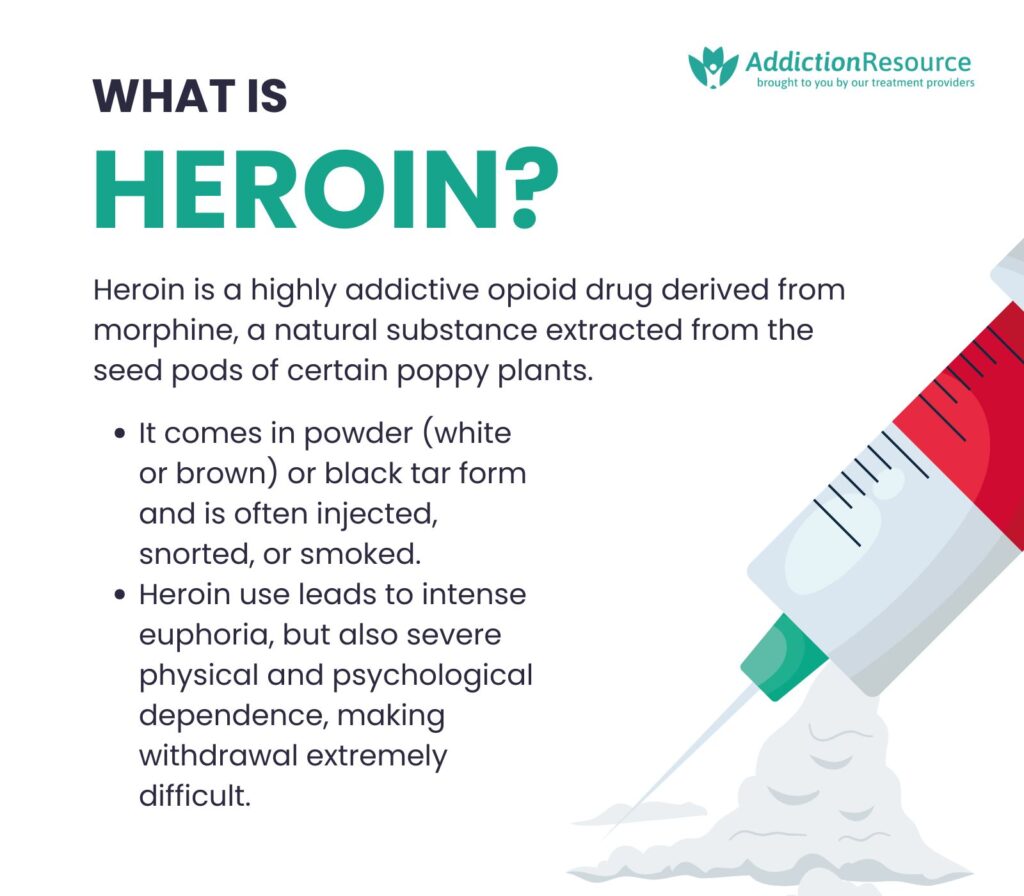

 FindTreatment.gov
FindTreatment.gov